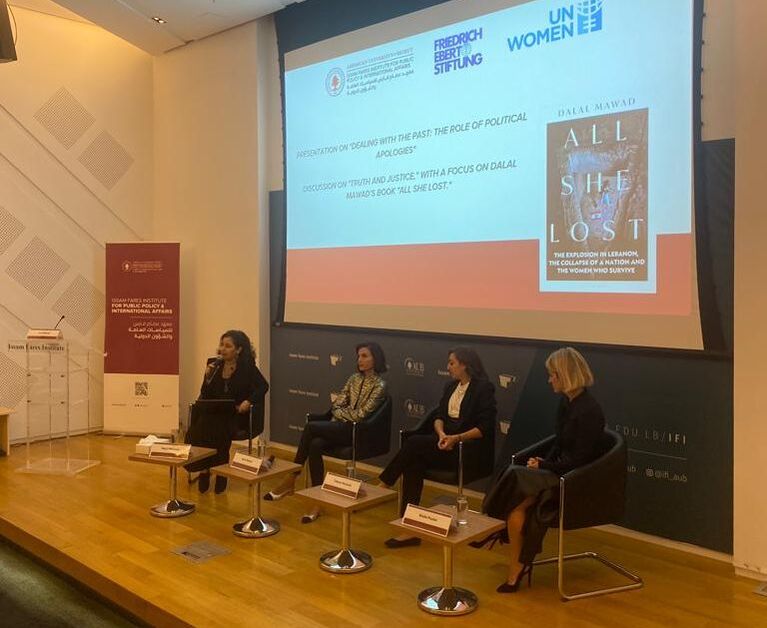|
The Women, Peace, and Security Regional Hub at IFI, in collaboration with UN Women and the Friedrich-Eber Stiftung, hosted a panel discussion on Monday, October 16, 2023, starting with a presentation on “Dealing with the Past: The Role of Political Apologies,” followed by a discussion on truth and justice with an emphasis on Dalal Mawad’s book, “All She Lost.” Thia Sagherian Dickey, Post-Doctoral Research Assistant in Peace & Conflict Studies, started by presenting on the role of political apologies and dealing with the past, highlighting the growing tendency of political apologies, particularly when it comes to violations of human rights during times of conflict. She discussed the essential components of thorough apologies, noting that expressions of regret are the most typical. Sagherian stressed that many parties, including activists, tribunals, and eyewitnesses, are frequently involved in these apologies, while also explaining the significant effects of political apologies. The presentation was followed by a panel discussion with “All She Lost” author Dalal Mawad, Lawyer and Book Interviewee Tatiana Hasrouty, and Human Rights Lawyer Sheila Paylan, moderated by the co-founder of the Lebanese Association for History Nayla Hamade.
The book, “All She Lost”, explores topics of grievance, trauma, collective women’s strength, Lebanon’s culture of impunity, mourning, and healing, all supported by firsthand stories of women who were directly impacted by the Beirut port explosion. When asked about the reasons that prompted writing the book from the perspective of women, Mawad explained that she wanted to give these women a safe space to share their stories and contribute to amplifying their voices. Her book allowed for an outlet for the accumulation of trauma, stemming not only from the Beirut Blast but also from the Civil War and subsequent crises that faced the country where trauma remained unresolved. Mawad emphasized three things that the women in her book were looking for: truth, apology, and accountability. Meanwhile, Hasrouty shared her experience of losing her father during the Beirut Blast. She emphasized her commitment to advancing justice and equality. Sheila Paylan offered her insightful knowledge and hands-on experience as a human rights lawyer, suggesting several tools that can be used to pursue justice for victims. At the same time, she emphasized the importance of the pressure that civil society could add to push organizations into taking action against perpetrators. Numerous themes arose during the discussion, including abuse, discrimination, bereavement, and the difficulties of pursuing justice in a society where impunity is the norm. This led to a significant question: whether an apology would be enough for the victims. Hasrouty noted that it was too late and wouldn’t be sincere because nobody cared at the time of the explosion to search for her father. As for Mawad, she emphasized that while an apology is essential and required, knowing the truth and having justice comes first. The panel was followed by a book signing and a reception. Watch the full recording of the discussion here. Comments are closed.
|
Archives
July 2024
|

